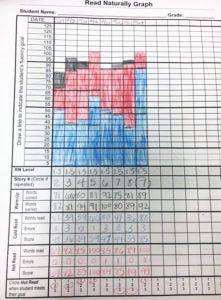
Some Literacy First students begin our program very far behind: their reading skills are more than one grade level lower than the state guidelines for their current grade. For these students, “significant progress ” means that they make exponential gains in reading but they are still below their grade level at year’s end.
However, this progress remains a great achievement. Assessment scores don’t always show a student’s character development, which is critical to their learning development. While their experience with Literacy First means that they will continue to take advantage of opportunities in the classroom for years to come, they have also developed an attitude of perseverance they can rely on.
Jordan, a second-year tutor, recently described how she worked with a student to achieve this vital mindset.
By Jordan Smith, 2018-2019 Literacy First tutor
One of the most valuable aspects of returning as a leader for a second year with Literacy First is the firsthand understanding of how much we can transform our students as readers and learners. One of my students last year didn’t graduate (reach her grade level in reading), but she made significant gains and improvements in her reading skills.
Even more importantly, she transformed how she viewed learning.
Elise was a second-grade student who started well below our projected benchmark scores at the beginning of the year. She was supposed to be reading 50 words in a minute, but she was reading less than 20 consistently. In the literacy field, this is known as “fluency.”
At Literacy First, we track daily lessons and weekly progress manually on a bar graph so that students can see their results (and then tutors input results into our secure database). Our daily fluency lessons were at the lowest possible level, and Elise was making progress and improving on those stories.
But our weekly assessments were five levels more difficult, and Elise knew it. Every week, I could see the dread in her eyes when I pulled out my yellow assessment book and asked her to read a passage for me. Elise could see that the progress she was making wasn’t reflected on her progress graph, as the gap between her scores and the next benchmark point continued to widen.
“It’s too hard,” she would say. It was like she was giving herself permission to give up before she’d even started.
I knew Elise loved to read, and I knew she had so much potential to improve, but letting her judge her own abilities based on these weekly stories wasn’t helping the process. If she thought the story was too hard, she would quit before she started and score lower, which confirmed for her that the story was too hard.
We had to reframe the language that she used about reading these stories to break the cycle.
The next assessment passage looked just like all the others: a page full of text with lots of long, tricky words that Elise didn’t know yet.
”It’s too hard,” she said.
“It is hard,” I told her. “But you can try your best. I’m here to help you if you get stuck. Let’s just try as hard as we can, and ask for help if you need it.’”
Elise tried her best. That week, we didn’t do much better on that assessment than we had on all the others, but we kept using our new language. Week by week, any time she told me a story was too hard, I had her stop and rephrase it to, “It’s hard but I’ll try.”
Eventually, I didn’t have to correct her anymore; when I pulled out a story she knew was hard, she’d take a deep breath and say, “I’ll try!”
Elise didn’t graduate from Literacy First, but by the end of the year, she had moved up three levels on our daily lessons, and was consistently scoring forty words higher than she had at the beginning of the year.
The single biggest thing that helped her improve her reading skills was changing the way she thought about learning.
When she had the fixed mindset of “this is too hard for me,” she was letting herself quit before she started. When we changed the language she used to “this is hard, but I can try,” she knew that her effort was more important than her score — and her scores actually started to go up!
This growth mindset was so essential to Elise’s progress as a reader in Literacy First. I know that she’ll continue to make gains outside of our program because she’ll carry that mindset with her. Any new challenge that Elise encounters won’t be easier or less intimidating, but she’ll take a deep breath and be brave enough to say, “I’ll try.”
